

Jump to winners | Jump to methodology
Tough economic times across Australia and New Zealand have brought the best law firms to the fore. These skilled and talented advocates have become crucial players in supporting clients and businesses navigate the challenging environment in both nations.
These firms have also shown a steadfast commitment to excellence, upholding ethical standards and offering solutions in a range of sectors and industries.
Australia is on a path towards an economic recession, as highlighted in a report by Deloitte in August 2024. The report indicates that the private sector has implemented an external hiring freeze, leading to projections that around 100,000 Australians may soon join the ranks of the unemployed.
Data from the Australian Bureau of Statistics shows the unemployment rate has climbed to 4.2% in both July and August 2024 – its highest level since November 2021 – as the slowdown continues.
The increased demand for legal services though is clear, as between 2020 and 2022, the number of solicitors increased by 6,686 according to the latest National Profile of Solicitors. This total of 90,329 solicitors is also a 57% rise since 2011.
More specifically, there has been a 104% increase in lawyers who have gone into the corporate legal sector since 2011. This is mirrored in the demand for transactional practice services (commerce, business and finance) increasing by 8.5% between FY 2024 and 2023.
“Things are getting tighter financially, and businesses are being put under a lot more pressure. We find that influences the type of work that comes to us,” says Mitchell Zadow, managing principal at Sharrock Pitman Legal. “We’ve seen a marked increase in the number of disputes that are going to litigation, whereas before, people would avoid going to court if they could, which is a sign of the economic situation in Australia.”
New Zealand’s GDP growth has been falling since June 2023, with the official Stats NZ figure for June 2024 showing an overall contraction of 0.2%, raising serious concerns over a recession being declared later in the year.
“There has been an unofficial recession here for some time now, as business confidence has been low,” says Glenn Marvin, COO at Norling Law. “We’ve seen liquidations go to the highest level over the last decade on a rolling annual basis. There are so many businesses that need advice and support. The internal niggles that used to just be a niggle in the good times are becoming massive problems with shareholder disputes.”
This economic milieu has enabled the legal industry to thrive on both sides of the Tasman Sea.
A 2024 Australia State of the Legal Market report from Thomas Reuters shows that overall demand for legal services increased by 7.5% from FY 2024 to 2023, which is a 477% rise when FY 2024 to 2022 is compared.
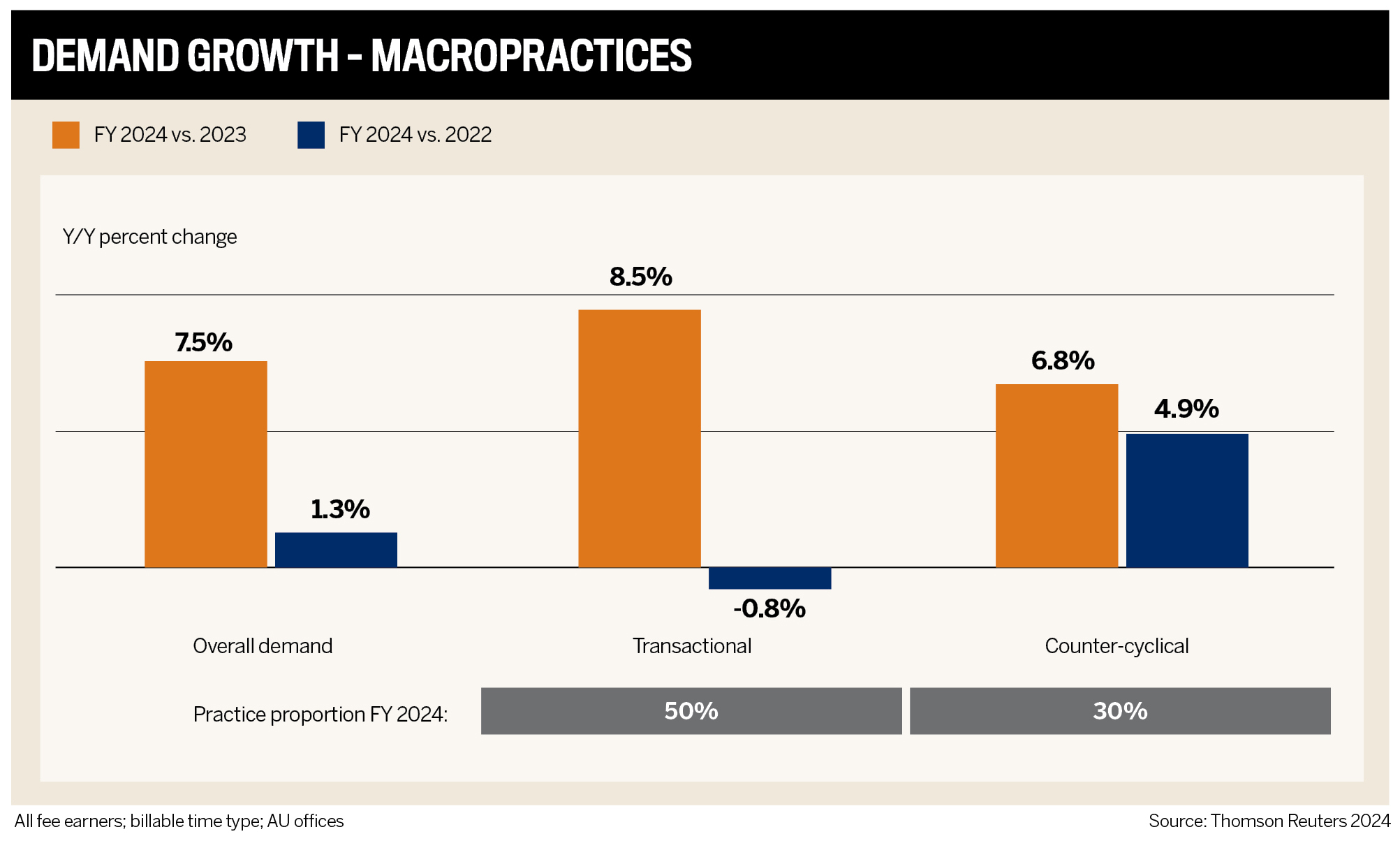
Banking and financial services had the greatest demand, with 10.9% growth, with dispute resolution also recording healthy growth of 6.2%, which substantiates the feeling and insight from industry players.
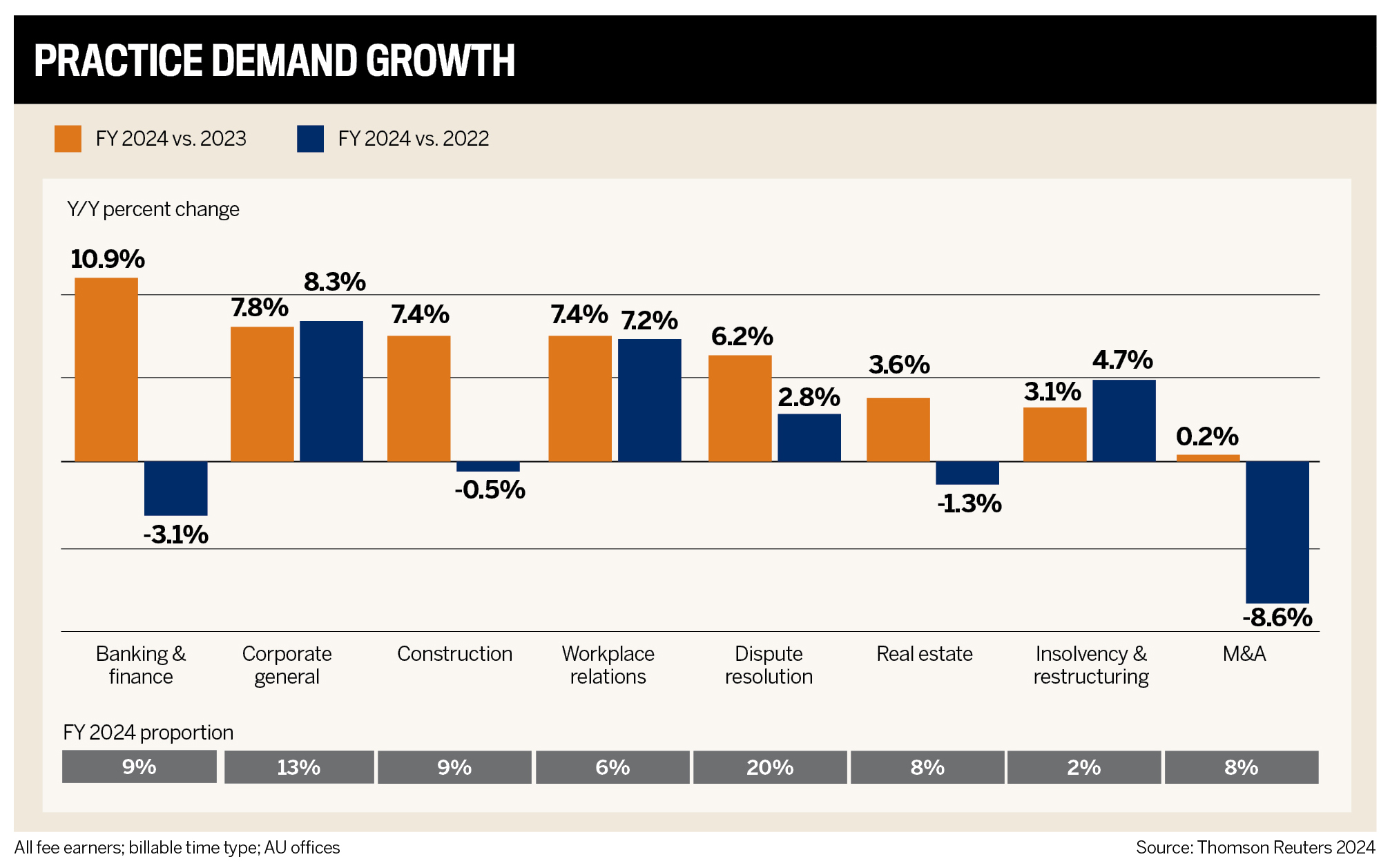
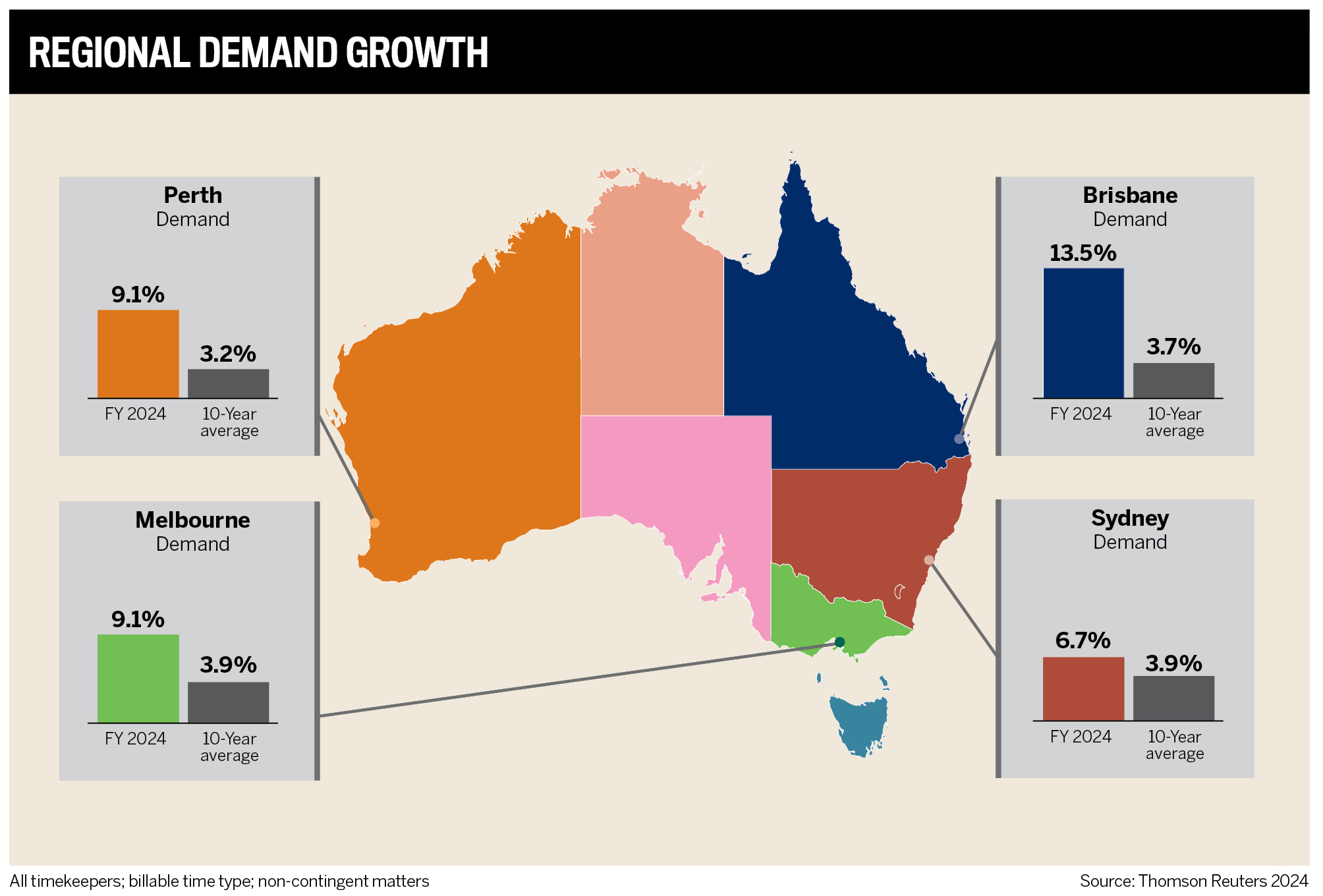
Figures from the New Zealand Law Society reveal a 6.5% growth in legal services in 2024, with a 4.1% annualised increase from 2019 to 2024.
Australasian Lawyer and NZ Lawyer recognised the Law Firms of the Year 2024 by analysing and studying how these organisations have made strides over the past 18 months in areas including:
recruitment
diversity
employee retention
acquisitions
client growth
financial performance
unique value propositions
Following an extensive review process, 30 firms were named as the top law firms in Australia (24) and New Zealand (6).
Legal senior recruitment manager at Hays Australia, Tina Kokkalis, believes these current times are challenging firms to perform in trying circumstances.
“The legal industry is grappling with rising client expectations, increased competition from alternative legal service providers and the challenge of adopting new technologies such as AI,” she says. “Talent shortages, particularly in specialised practice areas, remain a key concern. Law firms need to prioritise innovation, embrace flexible working and develop strategies to attract and retain a diverse talent pool. Sustainability will also become a more prominent focus, with firms expected to take stronger stances on environmental and social issues.”
Rhodes McLeod Consulting released a Salary Expectations Survey in September 2024, with some key findings:
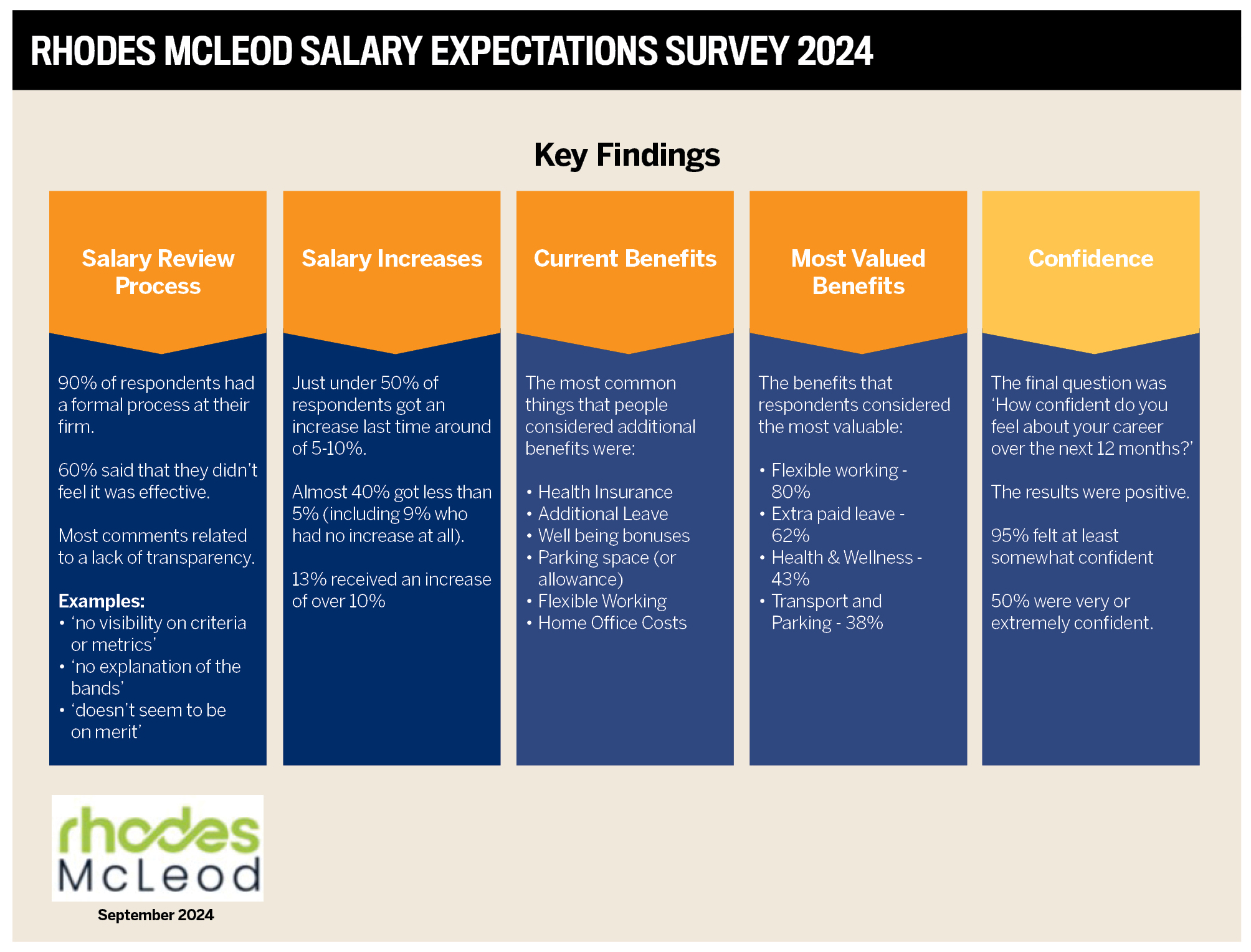
“Transparency, or lack of it, particularly in relation to performance reviews, leads to employee frustration about their ability to manage their careers,” says director Kirsty Spears. “Diversity is important to people. I’ve seen examples of young female lawyers who didn’t even want to interview with firms where they couldn’t see sufficient diversity in the partnership group. There are subtle messages about how forward-thinking and progressive a firm is based on the make-up of the senior team.”
Pro bono work can be a balancing act, especially for smaller firms who do not have the resources.
“While it is commendable, not all law firms have the resources or capacity to offer such services. A significant challenge lies in balancing the allocation of resources between pro bono initiatives and fee-earning work, which can strain a firm’s capabilities,” says Robert Kruger, senior manager – legal at Robert Walters Australia.
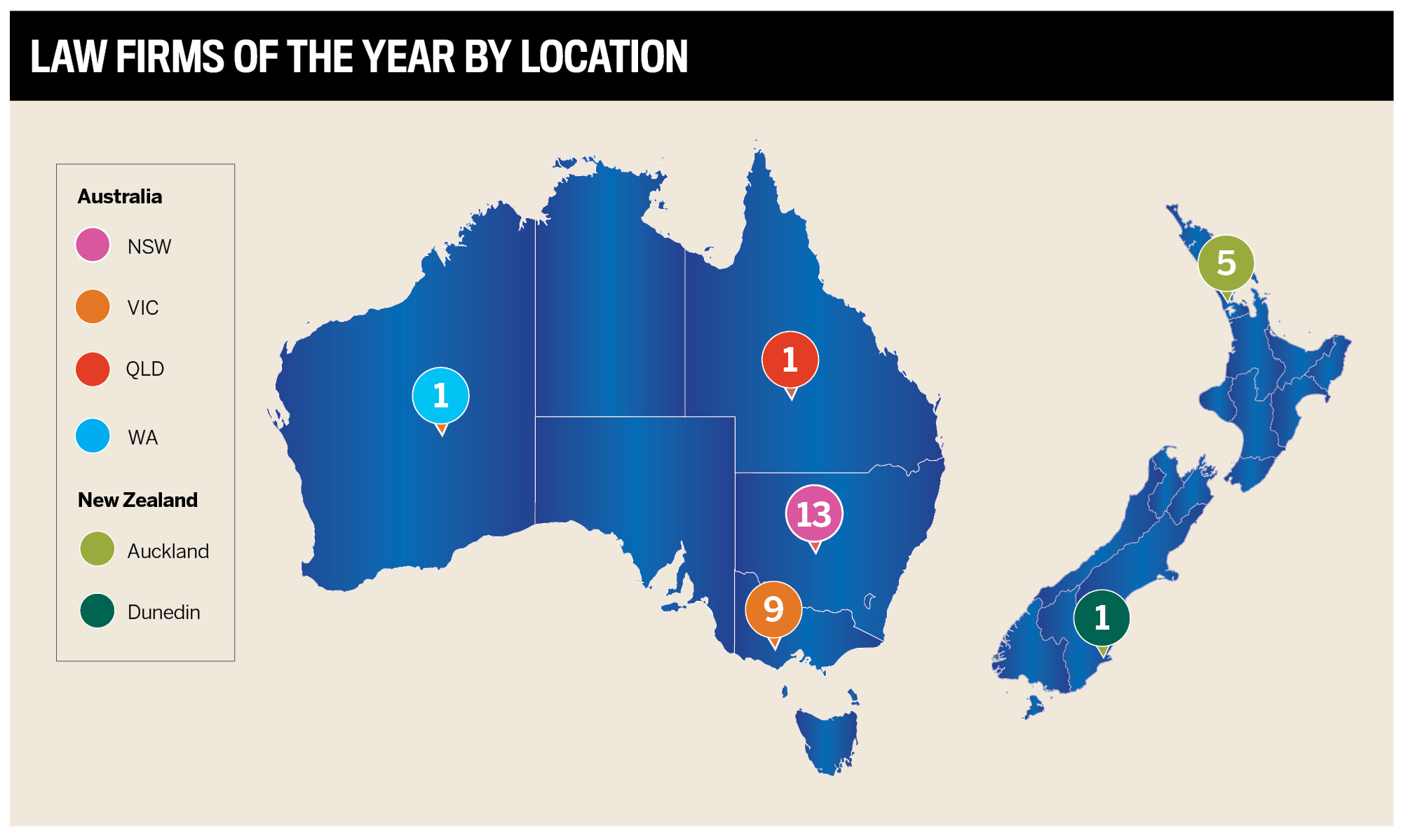
These law firms are thriving in a difficult industry, according to Kruger.
“The legal industry is currently facing a talent shortage that is expected to persist, particularly as markets in major cities like London, New York and Dubai become more active,” he says. “Firms must remain competitive in their fee structures to attract and retain clients while also offering appropriate compensation to recruit and maintain high-performing staff.”
The firm yielded historic organic growth by focusing on being the city’s most caring law firm.
The 2023/24 financial year saw billings continue to grow from the previous six-month period, resulting in a year-on-year increase of 22% in overall revenue and a 31% increase in profit, marking its best result on record.
“We aren’t aware of any other law firm that puts care for their customers at such a high watermark,” says Zadow. “Our philosophy is that if we get that right and build those good relationships with customers and build trust, everything else will flow from that.”
Keeping up to date with the latest technologies improves Sharrock Pitman Legal’s efficiency.
“AI is an absolute game changer, and from the beginning, we’ve taken an approach of encouraging the team to use it carefully and cautiously,” Zadow says. “It can help explain a legal term or get through a writer’s block by drafting the skeleton of an article.”

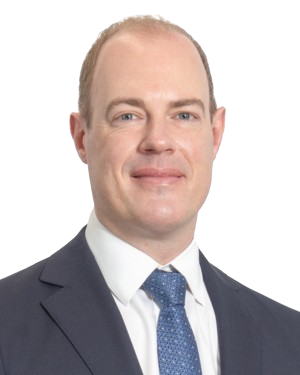
In 2024, the firm has been establishing a voluntary technology and innovation committee that reports its findings and recommendations to the principals.
Zadow says, “It achieves two objectives: it improves teamwork and gives the team an opportunity to have some fun with new technologies, while it also shapes how we fundamentally do things, for the better.”
Sharrock Pitman proudly encourages lawyers to volunteer in their local community, serving charities and organisations.
“We see our role in the community as quite a significant one – to give back, and we’re in a position to be able to do that,” says Zadow. “We support causes on a local, national and international level financially, and we have a community care charter, which is one of the key pillars of our firm.”
That charter is an internal document that regulates and guides how the firm supports the community, both as an organisation and individually.
Zadow says, “We don’t compel lawyers to do it, but we strongly encourage it. A number of lawyers are currently on boards of not-for-profits, which have ranged from community legal centres to independent schools and other community groups. We've allowed them the time to do that. It’s hardwired into our culture.”
The firm experienced impressive growth, with double-digit figures in both revenue and profit across various sectors.
Key to this was the outcome of a strategic review undertaken in FY22, which renewed attention on planning and leadership across all sectors.
This growth includes:
11% in government (with over 20% in Commonwealth Government)
26% in health
5% in other sectors, including real estate, education, infrastructure and technology
Notably, while the government sector has been a cornerstone for over a century, the recent growth in this area is particularly impressive.
“It’s in our DNA. A lot of our lawyers and partners do an enormous amount of work with the government. We tap into it in our training, so people understand what it is to work with government clients, because the drivers are different and there’s different pressures,” says board member and partner Catherine Dunlop.
“It’s about investing in deep relationships with government clients and being proactive in knowing what’s driving them that comes with just picking up a newspaper in the morning and seeing a minister is concerned about a topic, so knowing there’s going to be a call coming,” she adds.
Maddocks’ work in government has primarily focused on cyber, climate change and privacy.
Dunlop says, “There’s lots of training and work on our IT systems. One of our partners is working on a new single digital patient record, which would be a standard across all health districts in New South Wales.
“The climate change work is important to us. We are working with several local authorities and councils on planning decisions going forward where there is flood or drought risk and what that looks like for infrastructure funding at the state and local government level.”

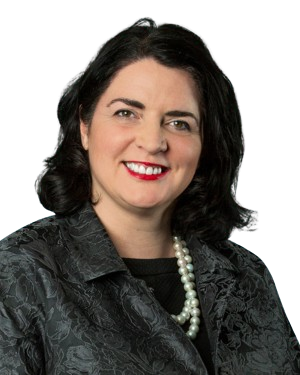
In that area, they also focus on work safety.
“We advise whether people can work in certain heats during the summer,” says Dunlop. “It might seem like a small issue, but if 20% of the time they are unable to work, what does that mean for planning? Another issue is per- and polyfluoroalkyl substances (PFAS) at Australian airports, and there’s all sorts of litigation and clean-up issues around that.”
The firm also shows tremendous growth in the health sector, with a 26% increase by focusing on:
medical technology
aged care
“We have a dedicated medical team, whether it’s medical technology to help patients or aged care, which are ever-evolving spaces with regulatory changes and development,” says Dunlop. “It’s wonderful having a team that is experts in their field and can work right across whatever changes there are to legislation.”
The enthusiasm of Maddocks’ workforce helps garner results, but its diversity is its true strength. Including support staff and lawyers, the firm has 71% female representation.
“We never take diversity for granted; we want to be a place where you can come and be your true self at work,” says Dunlop. “It’s not a checklist approach; we’re constantly investing and making sure we get the benefits of everybody’s background and ideas.”
In 2023, the firm made the decision to expand its practice groups from five to nine, with senior partners leading each. In tandem with bringing on seven new lateral partners, it leveraged profits of 6.6%.
The aim was to give greater focus and allow teams to work in a more client-centric and collaborative manner, all part of its 2027 strategy.
“We’re in a mood for growth, and there’s a bit of momentum in the business now. There’s a generational change in the industry as the drivers are coming from younger people becoming more involved,” says national managing partner Andrew White.
Sparke Helmore’s nine practice groups are:
projects, government and commercial
construction, infrastructure and procurement
corporate and commercial
property environment and finance
compulsory third party insurance
speciality and statutory lines insurance
casualty lines insurance
government, public and regulatory
industrial relations, workplace safety and employment law
New lateral partners have reinvigorated the firm.
“It has allowed us to improve our offering in construction, tech, insurance and cyber, where there is enormous growth, and we aim to be the leaders in the field,” says White.


Another focus at Sparke Helmore has been set on enhancing its diversity by launching a 2026 Diversity, Equity and Inclusion (DE&I) Strategy and hiring new DE&I chair, Naomi Simmons.
“Our focus is all about inclusion and ensuring everyone feels included, involved, heard, listened to and embraced,” says White. “However, it doesn’t try to break people into groups; we’re all equal and we’re very democratic.
“Naomi brings a freshness and change to the role, coming from a multi-racial and regional background being from the Hunter Valley. She is starting to put her stamp on things already.”
In FY 23/24, the firm reached its highest ever result: 17,599.6 pro bono hours, which equates to an average of 40.1 hours per FTE.
“We aim to do more going forward, especially as the business grows. We aim to find worthy places to do pro bono work, be it with First Nations and underprivileged groups,” says White. “It’s a great opportunity for our young lawyers, and as a law firm in a privileged country, we have a responsibility to give back and make the world a better place.”
The young firm continues to go from strength to strength.
Specialising in resolution of insolvency disputes and business restructure, it recorded a revenue growth of 15% and is well positioned to continue that path, with a forecasted 22% increase in 2024/2025. From October 2022 to March 2024, the firm saw a whopping profit increase of 115% and is forecasting an 8.5% increase in September 2025, as it doubles its office size to meet projected growth.
Focusing on niche areas of law has proven fruitful.
“We do not have conflicts with other firms and regularly partner and collaborate with other firms that don't necessarily have litigation, insolvency, and shareholder dispute experiences,” says Marvin. “We use a non-traditional strategy for growth with social media advertising, and it is data-driven. We go to the people, as it’s on the firm to do the hard work to find new clients.”
While it’s non-traditional, Norling Law has a structured model.
“We incorporate the scaling up business methodology; our leadership team goes away four times a year to plan for each quarter. We have a very well-defined plan with budgets all the way through to 2028,” Marvin says.


Norling Law believes education is beneficial to both employees and the firm.
“Every single person in the firm has a professional and personal development plan, as it’s about improving both sides of your life,” says Marvin. “To build good business, you also need to build good people. It can have a massive impact on how they show up at work during the day, even if it’s not directly related to their role.”
The firm’s steadfast culture is geared to enable it to have further success.
“It relates to outstanding communication, exceptional service, delivering innovation and celebrating wins. We are an incredible place to work, and happy people are more productive,” Marvin says.
Their growth can be seen tangibly with a planned move to a bigger office, allowing the firm to double its headcount.
Marvin says, “We have a stringent recruitment process, as we want people to fit our culture and values. We have three people joining the firm in early 2025, one of whom is coming from South Africa. It will have a massive impact on quality and the breadth of experience in our firm.”
Until 2014, as primarily a South Island commercial firm with expertise in renewable energy, infrastructure, mid-market corporate transactions and property, the decision to open an office in Auckland has been a resounding success.
Focusing on the renewable energy sector has seen Anderson Lloyd grow its revenue and profit exponentially.
“We are the leading renewable energy firm in New Zealand, and it’s an area that we anticipated would grow because of the environmental issues,” says CEO Richard Greenaway. “Our country is facing infrastructural challenges with road, rail and energy, so we have put a lot of our focus into this practice area.”
The firm has a clear focus on improving in all areas.
Greenaway says, “We strive to reinvest our profits back into the business so we can grow, and investing in areas like technology helps us to continue to deliver the best possible service.”

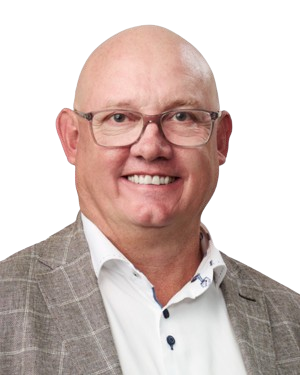
Anderson Lloyd endeavours to give back to communities. In 2024, the firm was re-awarded with Rainbow Tick as its DE&I initiatives focus on making the workplace welcoming for all while empowering Māori people to join the industry.
Three of the firm’s partners are Māori, making up over 10% of its partnership.
“Māori is a big part of the broader and business community in our country, so having equal representation of Māori in our firm to represent Māori clients is critical to us,” says Greenaway.
The firm has a number of internship programs working with Ngāi Tahu and Ngāti Kahungunu, as well as an AL in Schools internship. Additionally, its cultural intelligence program, which includes te reo lessons and education to better understand Te Ao Māori, as well as developing a firm karakia, demonstrates a commitment to cultural understanding.
Anderson Lloyd’s pro bono work is of significant importance, committing to 960 hours in 2023, with a dedicated partner who coordinates the work in each office.
“It’s always a challenge, because all law firms earn their money through chargeable client work, but there's a lot of benefit. It’s a good way for people to give back to the community, individuals and organisations that are in need,” says Greenaway.
From June 24 to July 19, Australasian Lawyer and NZ Lawyer accepted nominations for the 2024 Law Firms of the Year list. Firms were invited to submit nominations through an online entry form. The evaluation focused on their performance over the past 18 months, highlighting an exceptional period in which they successfully navigated various pressures while maintaining excellent client service.
Nominations were assessed based on advancements in strategies such as recruitment, diversity, employee retention, acquisitions, new offices, new alliances, client growth, financial performance and unique value propositions.
Following the review process, 30 firms were recognised as the top law firms in Australia and New Zealand for 2024.